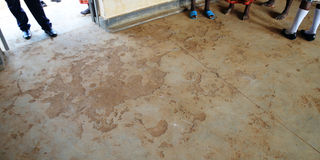Prime
Local leaders worry over state of new seed schools

The floor of one of the newly-constructed buildings at Lukaya Seed School in Kalungu District is already peeling off. PHOTO/WILSON KUTAMBA
What you need to know:
- The leaders say some buildings have glaring defects and if not swiftly rectified, may affect their durability.
Leaders in Masaka Sub-region say a section of newly-commissioned seed schools have glaring defects and if not swiftly rectified, may affect the durability of the buildings.
The local leaders say some buildings at the new schools, including Bukakkata Seed School in Masaka District, Mbiriizi Seed School in Lwengo District, Lukaya Seed School in Kalungu District and Samson Kalibbala Kamya Memorial Seed School in Rakai District were shoddily constructed and the floors are already cracking and peeling off.
The four schools were commissioned last week.
In Lwengo, the district chairperson, Mr Ibrahim Kitatta, has expressed concern that the new school structures may crumble in a few years since the buildings were constructed in a wetland.
Flooding
Mr Kitatta said accessing the school on a rainy day is a nightmare since the entire compound floods and runoff water enters all the buildings.
“This is going to cost us a lot if we don’t act quickly. The ministry [of Education] had promised to provide some Shs200m to facilitate improvement of the compound so that runoff water doesn’t enter the buildings, but the money is not forthcoming,” he told Daily Monitor at the weekend.
The Mbirizi Seed School head teacher, Mr Abdallah Nakalya Nsubuga, said the school operations get paralysed whenever it rains.
“When it rains, we are forced to close the school because the compound becomes inaccessible due to flooding.
“We have a fear that when it rains daily for some days, we may be forced to close the school for several days,” he said.
While commissioning Lukaya Seed School last week, Dr Joyce Moriku Kaducu, the State minister for Primary Education, indicated that the shoddy works at the new schools were an eye-opener to the ministry and the technical teams overseeing the project.
Each of the commissioned seed schools cost Shs2.125b, according to Dr Kaducu.
The project is funded by the World Bank under the Intergovernmental Fiscal Transfer (UgIFT) programme.
Dr Kaducu said they have taken note of the irregularities, which she attributed to poor workmanship by the contractors.
“I instruct the chief administrative officer of Kalungu District to halt payment of the balance to the contractor until an assessment is done and the defects are corrected,” the minister said.
She, however, blamed the district civil engineers for not raising the red flag whenever they noticed shoddy works.
“We still have their [contractor for Lukaya Seed School] retention money, about Shs200m, and we shall not release that money until they come and correct these defects,” she said.
Ms Anifa Kawooya, the state minister for Health in-charge of General Duties, who commissioned Mbirizi Seed School, said she was disappointed by the quality of work done by the contractor.
“The picture I got on the ground made me cast doubt on the competence of the contractor. I’m not certain whether these buildings will stand for even a year. I’m going to report back to the relevant authorities,” she said.
Available records indicate that the schools were constructed by MMACKS Investments Limited, whose directors did not attend the commissioning of any of the projects.
Efforts to speak to the contractor were futile by press time.
Mr Charles Tamale, the Lukaya Town Council chairperson, said problems stem from lack of coordination between the local project beneficiaries and the government officials.
“Government should always involve the local people because they do these projects for them. In many cases, we find ourselves monitoring what we weren’t involved in at the beginning,” he said.
Mr Ssemwanga Gyaviira, the Buyamba County MP, who represented Dr Kaducu at the commissioning of Samson Kalibbala Kamya Memorial Seed School, acknowledged the glaring defects, especially on the floor and asked the contractor to swiftly fix them.
SEED SCHOOLS
A total of 70 new seed secondary schools have so far been constructed and at least 25 commissioned in various sub-counties across the country.
With funding from the World Bank, the government had planned to construct 117 seed schools in the first phase. However, some sub-counties reportedly failed to secure five acres of land that were required for construction of the schools.
In the second phase, government plans to construct 115 schools and 27 in the third phase.




